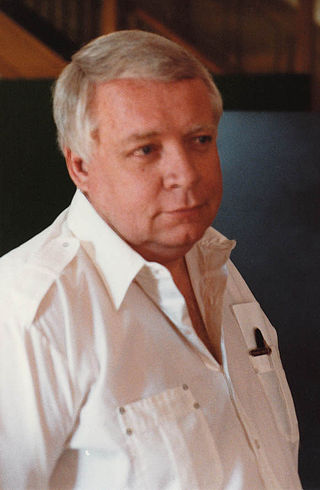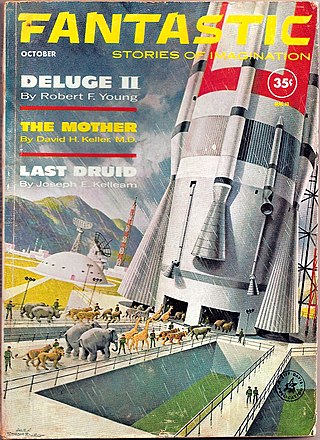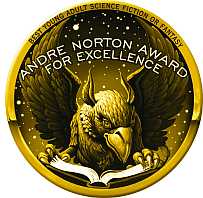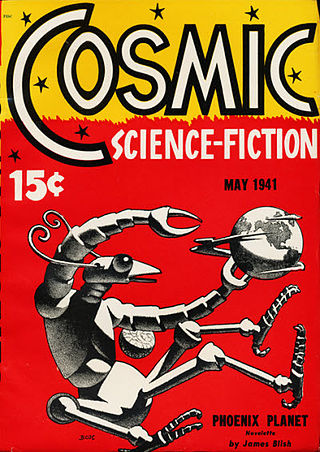
Poul William Anderson was an American fantasy and science fiction author who was active from the 1940s until his death in 2001. Anderson also wrote historical novels. He won the Hugo Award seven times and the Nebula Award three times, and was nominated many more times for awards.

The Science Fiction and Fantasy Writers of America, doing business as Science Fiction and Fantasy Writers Association, commonly known as SFWA is a nonprofit 501(c)(3) organization of professional science fiction and fantasy writers. While SFWA is based in the United States, its membership is open to writers worldwide. The organization was founded in 1965 by Damon Knight under the name Science Fiction Writers of America. The president of SFWA as of July 1, 2021 is Jeffe Kennedy.

Damon Francis Knight was an American science fiction author, editor, and critic. He is the author of "To Serve Man", a 1950 short story adapted for The Twilight Zone. He was married to fellow writer Kate Wilhelm.

Algirdas Jonas "Algis" Budrys was a Lithuanian-American science fiction author, editor, and critic. He was also known under the pen names Frank Mason, Alger Rome in collaboration with Jerome Bixby, John A. Sentry, William Scarff, and Paul Janvier. In 1960, he authored Rogue Moon, a novel.

Amazing Stories is an American science fiction magazine launched in April 1926 by Hugo Gernsback's Experimenter Publishing. It was the first magazine devoted solely to science fiction. Science fiction stories had made regular appearances in other magazines, including some published by Gernsback, but Amazing helped define and launch a new genre of pulp fiction.
The Damon Knight Memorial Grand Master Award is a lifetime honor presented annually by the Science Fiction and Fantasy Writers Association (SFWA) to a living writer of fantasy or science fiction. It was first awarded in 1975, to Robert Heinlein. In 2002, it was renamed after Damon Knight, the founder of SFWA, who had died that year.

Fantastic was an American digest-size fantasy and science fiction magazine, published from 1952 to 1980. It was founded by the publishing company Ziff Davis as a fantasy companion to Amazing Stories. Early sales were good, and the company quickly decided to switch Amazing from pulp format to digest, and to cease publication of their other science fiction pulp, Fantastic Adventures. Within a few years sales fell, and Howard Browne, the editor, was forced to switch the focus to science fiction rather than fantasy. Browne lost interest in the magazine as a result and the magazine generally ran poor-quality fiction in the mid-1950s, under Browne and his successor, Paul W. Fairman.

Carol Emshwiller was an American writer of avant-garde short stories and science fiction who won prizes ranging from the Nebula Award to the Philip K. Dick Award. Ursula K. Le Guin has called her "a major fabulist, a marvelous magical realist, one of the strongest, most complex, most consistently feminist voices in fiction." Among her novels are Carmen Dog and The Mount. She also wrote two cowboy novels, Ledoyt and Leaping Man Hill. Her last novel, The Secret City, was published in April 2007.

A science fiction magazine is a publication that offers primarily science fiction, either in a hard-copy periodical format or on the Internet. Science fiction magazines traditionally featured speculative fiction in short story, novelette, novella or novel form, a format that continues into the present day. Many also contain editorials, book reviews or articles, and some also include stories in the fantasy and horror genres.

Escape Pod is a science fiction podcast magazine produced by Escape Artists, Inc. It proclaims itself "the world's leading science fiction podcast". The present co-editors are Mur Lafferty and S. B. Divya.
Clarence Howard "Bud" Webster was an American science fiction and fantasy writer who is also known for his essays on both the history of science fiction and sf/fantasy anthologies as well. He is perhaps best known for the Bubba Pritchert series, which won two Analytical Laboratory readers' awards from Analog Science Fiction and Fact magazine. Farewell Blues was featured on the cover of the January/February 2015 issue of The Magazine of Fantasy & Science Fiction. Webster is also known for his survey of Groff Conklin's contribution to science fiction in 41 Above the Rest: An Index and Checklist for the Anthologies of Groff Conklin.

The Andre Norton Nebula Award for Middle Grade and Young Adult Fiction is an annual award presented by the Science Fiction and Fantasy Writers Association (SFWA) to the author of the best young adult or middle grade science fiction or fantasy book published in the United States in the preceding year. It is named to honor prolific science fiction and fantasy author Andre Norton (1912–2005), and it was established by then SFWA president Catherine Asaro and the SFWA Young Adult Fiction committee and announced on February 20, 2005. Any published young adult or middle grade science fiction or fantasy novel is eligible for the prize, including graphic novels. There is no limit on word count. The award was originally not a Nebula Award, despite being presented along with them and following the same rules for nominations and voting, but in 2019 SFWA announced that the award was considered a Nebula category.

Cat Rambo is an American science fiction and fantasy writer and editor. Rambo uses they/them pronouns. Rambo was co-editor of Fantasy Magazine from 2007 to 2011, which earned them a 2012 World Fantasy Special Award: Non-Professional nomination. They collaborated with Jeff VanderMeer on The Surgeon's Tale and Other Stories, published in 2007.

The Nebula Awards annually recognize the best works of science fiction or fantasy published in the United States. The awards are organized and awarded by the Science Fiction and Fantasy Writers Association (SFWA), a nonprofit association of professional science fiction and fantasy writers. They were first given in 1966 at a ceremony created for the awards, and are given in four categories for different lengths of literary works. A fifth category for film and television episode scripts was given 1974–78 and 2000–09, and a sixth category for game writing was begun in 2018. In 2019 SFWA announced that two awards that were previously run under the same rules but not considered Nebula awards—the Andre Norton Award for Middle Grade and Young Adult Fiction and the Ray Bradbury Award for Outstanding Dramatic Presentation—were to be considered official Nebula awards. The rules governing the Nebula Awards have changed several times during the awards' history, most recently in 2010. The SFWA Nebula Conference, at which the awards are announced and presented, is held each spring in the United States. Locations vary from year to year.

Nora Keita Jemisin is an American science fiction and fantasy writer. Her fiction includes a wide range of themes, notably cultural conflict and oppression. Her debut novel, The Hundred Thousand Kingdoms, and the subsequent books in her Inheritance Trilogy received critical acclaim. She has won several awards for her work, including the Locus Award. The three books of her Broken Earth series made her the first author to win the Hugo Award for Best Novel in three consecutive years, as well as the first to win for all three novels in a trilogy. She won a fourth Hugo Award, for Best Novelette, in 2020 for Emergency Skin. Jemisin was a recipient of the MacArthur Fellows Program Genius Grant in 2020.
Lightspeed is an American online fantasy and science fiction magazine edited and published by John Joseph Adams. The first issue was published in June 2010 and it has maintained a regular monthly schedule since. The magazine currently publishes four original stories and four reprints in every issue, in addition to interviews with the authors and other nonfiction. All of the content published in each issue is available for purchase as an ebook and for free on the magazine's website. Lightspeed also makes selected stories available as a free podcast, produced by Audie Award–winning editor Stefan Rudnicki.
Rachel Swirsky is an American literary, speculative fiction and fantasy writer, poet, and editor living in Oregon. She was the founding editor of the PodCastle podcast and served as editor from 2008 to 2010. She served as vice president of the Science Fiction and Fantasy Writers of America in 2013.

Redstone Science Fiction was an online science fiction magazine. The first issue was published June 1, 2010 and maintained a regular monthly schedule until the September 1, 2012 issue.

Cosmic Stories and Stirring Science Stories were two American pulp science fiction magazines that published a total of seven issues in 1941 and 1942. Both Cosmic and Stirring were edited by Donald A. Wollheim and launched by the same publisher, appearing in alternate months. Wollheim had no budget at all for fiction, so he solicited stories from his friends among the Futurians, a group of young science fiction fans including James Blish and C. M. Kornbluth. Isaac Asimov contributed a story, but later insisted on payment after hearing that F. Orlin Tremaine, the editor of the competing science fiction magazine Comet, was irate at the idea of a magazine that might "siphon readership from magazines that paid", and thought that authors who contributed should be blacklisted. Kornbluth was the most prolific contributor, under several pseudonyms; one of his stories, "Thirteen O'Clock", published under the pseudonym "Cecil Corwin", was very successful, and helped to make his reputation in the field. The magazines ceased publication in late 1941, but Wollheim was able to find a publisher for one further issue of Stirring Science Stories in March 1942 before war restrictions forced it to close again.
Hungarian science fiction comprises books and films in the fiction genre produced all across Hungary.














